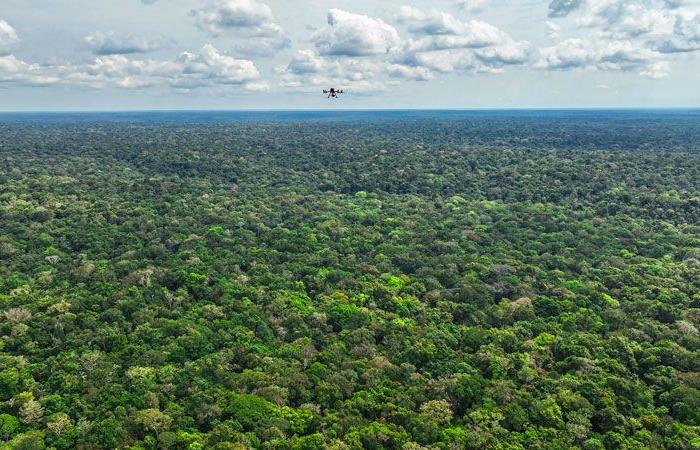The XPRIZE Rainforest, one of the world’s largest tropical forest biodiversity mapping initiatives, announced the winners of its international competition on Friday, November 15. The events, which took place over five years, involved more than 300 teams from 70 countries. The first two prizes were won by American teams. Third prize was awarded to the “Brazilian Team” from the University of São Paulo, Brazil. Selected among the twelve teams competing in the semi-final held in Singapore in 2023, the “Brazilian Team” participated in the final in the Brazilian Amazon during the summer of 2024, alongside five other finalist teams.
During the final, which took place from July 7 to 30, 2024, in the community of Tumbira, within the Rio Negro Sustainable Development Reserve, the finalist teams aimed to inventory the biodiversity in a plot of 100 hectares of Amazonian forest, without any humans entering the study area. Each team had 24 hours to collect data and samples from the plot, and an additional 48 hours to produce information about the flora and fauna found there.
The Brazilian team developed equipment and technologies involving drones, sensor networks, ground robots, collectors of tree twigs, water, leaf litter and soil, in order to analyze the Environmental DNA, images and sounds collected and deduce the diversity of flora and fauna.
In preparation for the competition, more than 1,000 Amazonian animal and plant species have had their DNA sequenced, in order to facilitate the identification of species based on DNA from soil, water or litter samples. None of these species had been sequenced before. The DNA group has developed a series of molecular biology protocols and bioinformatics pipelines deployable in the field. These innovations have made it possible to simultaneously identify hundreds of species or taxa of plants, vertebrates, and invertebrates from only a few environmental samples. Two laboratories from the CNRS and the University of Grenoble Alpes are particularly involved in these developments; the Biodiversity and Environment Research Center (CRBE) in Toulouse and the Alpine Ecology Laboratory (LECA) in Grenoble, as well as the Argaly company, an SME run by former LECA researchers.
The team also developed innovative remote sensing methods to quantify forest carbon and biomass, as well as to measure tree diversity. Automated image capture methods leveraging drone flight planning have been implemented. These high-resolution images were processed using new analysis methods implemented by the Pl@ntNet team, made up of researchers from CIRAD and INRIA laboratories; the Mixed BotAnic Research Unit and Modeling of the Architecture of Plants and Vegetations (AMAP) and the Robotics and Microelectronics Computer Laboratory of Montpellier (LIRMM). These researchers adapted their deep learning algorithms to the specific needs of the competition in terms of recognizing species from the Brazilian Amazon from photographs taken high up, above the canopy. The results obtained were shared with the team’s botanists, in order to assess their relevance, and then make it possible to map the precise location of certain tree species in the forest.
In total, the team documented 418 taxa (types of living things), of which 266 were identified to the species level. Their results include three potentially never-before-described species. Their analyzes also made it possible to document interactions between species and to identify those which constitute a fundamental resource for the development of the forest bioeconomy and which provide other valuable ecosystem services. The field work during the final was carried out by 18 members of the “Brazilian Team” over 24 hours. Over the next 48 hours, other team members worked tirelessly to analyze the data and write the final report.
Thanks to the price of 500 000 dollars, the “Brazilian Team” plans to create a fund for research and training focused on the conservation and restoration of the Amazon rainforest and the Atlantic forest, the two main forest ecosystems in Brazil. This initiative will strengthen the legacy of innovation and conservation of the XPRIZE competition.





